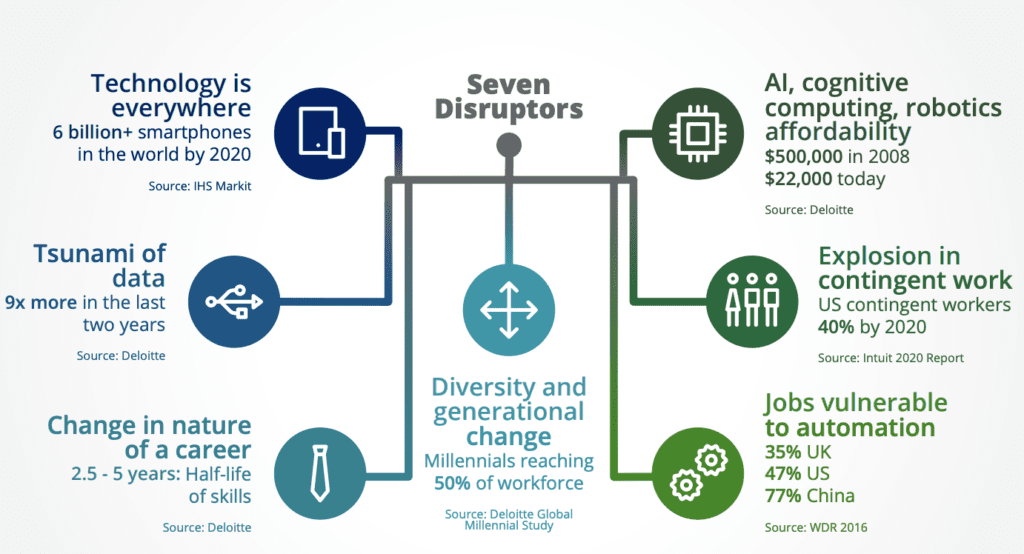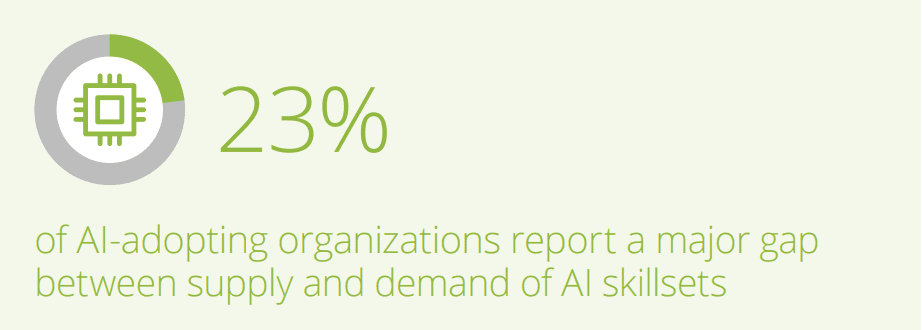Deloitte: Say goodbye to ‘traditional, hierachical, office life’
In order to thrive, organizations will have to figure out how technology can co-exist alongside humans.
Why You Should Care
Why technology and trust will shape the future of work.
Technology will free workers from menial tasks, allowing them to become more creative and strategic.
In order to thrive, organizations will have to figure out how technology can co-exist alongside humans.
You can wave goodbye to “traditional, hierarchy-orientated office life” forever.
That’s according to Deloitte’s latest “The Future of Work is Here” report which says younger employees would resist a potential return to the office.
Although organizations are increasingly moving towards hybrid working, the report argues that most employers aren’t ready for a wholesale democratization of work.
“More flexible work arrangements could have profound effects, not just on how we work, but where we work, how we communicate, and even on how cities are designed. The COVID-19 pandemic has, perhaps, given us a kaleidoscopic glimpse of the future of work […],” the report adds.
Deloitte groups seven disruptive trends that are shaping the future of work into two main categories: socio-demographic trends and enabling technology trends:

The seven disruptive trends shaping the future of work. Source: Deloitte.
The COVID-19 pandemic has supercharged these trends. “It has clearly accelerated digitization of organizations and has had a significant impact on contingent workers, especially where employment laws don’t provide sufficient support.”
Additionally, the report notes the diversity of the workforce is increasing as we live longer and hence work longer. At the same time, the concept of a career is changing: employees increasingly find climbing the corporate ladder less appealing, preferring project work and cross-functional moves, as well as self-employment and freelance work.
“These shifts are compounded by the expansion of connectivity, which is generating heaps of data and boosting the development of artificial intelligence, cognitive computing, and robotics,” the report adds.
What will change at work?
The main takeaway of the report is for employers and employers to be prepared for a dramatic change in day-to-day tasks.
As as a result, the report notes, many skillsets are becoming less relevant or even obsolete and organizations will look to employ people with capabilities that can’t easily be replicated by technology.
“Technological advances are enabling the automation of repetitive tasks and processes, allowing workers to focus on creativity, human experience, and innovation.
“At the same time, technology is changing the way we execute our work, generally augmenting our human capabilities and enabling us to complete tasks faster. It isn’t a bed of roses, however: technology can also inhibit productivity, for example if it has been poorly designed or because people don’t know how to use it (or both),” the report highlights.
As you would expect, demand for technical skills is changing rapidly, leading to skill shortages in some disciplines, such as artificial intelligence:

Source: Deloitte.
Working smart
According to the report, in order to survive in this increasingly digital environment, employees and employers should ask themselves these three questions:
- Does that task need to be done?
- Does it need to be done by people? If so, where can it be done?
- Can people and machines work together in an augmented way?
Technology has the potential to transform the roles of workers, beyond simple task levels, and enabling them to assume strategic significance.
This, the report adds, is about much more than just automation and process efficiency.
It’s about figuring out how to remain human in a technology-driven world: “Humanity and technology don’t need to be in conflict.”
Employee experience and trust
The next step is to define the optimal workforce to do the work — whether that’s having employees on payroll or relying on flexible talent. Once this is decided, employers need to design a bold, and engaging inclusive employee experience “because that is what people want.”
“They [people] expect organizations to take an active role in creating lasting value for themselves, their workforce, and society at large,” the report notes.
The pandemic has caused a significant shift in employee considerations. “Employees now consider well-being, flexibility and purpose, in addition to traditional rewards and benefits packages, when choosing who to work for,” it adds.
It’s therefore crucial that organizations take note of this and consider about the experience they provide to existing and new employees.
At the same time, businesses need to overhaul how they think about the office and tech capacity to support the optimum combination of distributed working and face-to-face interaction in physical workspaces.
The narrative building across the industry is that offices will no longer be the default place of work for everyone — even if some CEOs vehemently oppose remote working. Instead, offices should now be reimagined as places for innovation, co-creation, social engagement, teaming, and celebration.
Aside from innovative thinking and technology, the report says that business leaders should look to build trust across their entire organizations: “Without it, an organization will be flatfooted.”
Sign up to the UNLEASH Newsletter
Get the Editor’s picks of the week delivered straight to your inbox!

Columnist, The New York Times
Former editor of UNLEASH, Yessi is a seasoned tech journalist and regular contributor to Times Radio in the UK.
Contact Us
"*" indicates required fields
Partner with UNLEASH
"*" indicates required fields